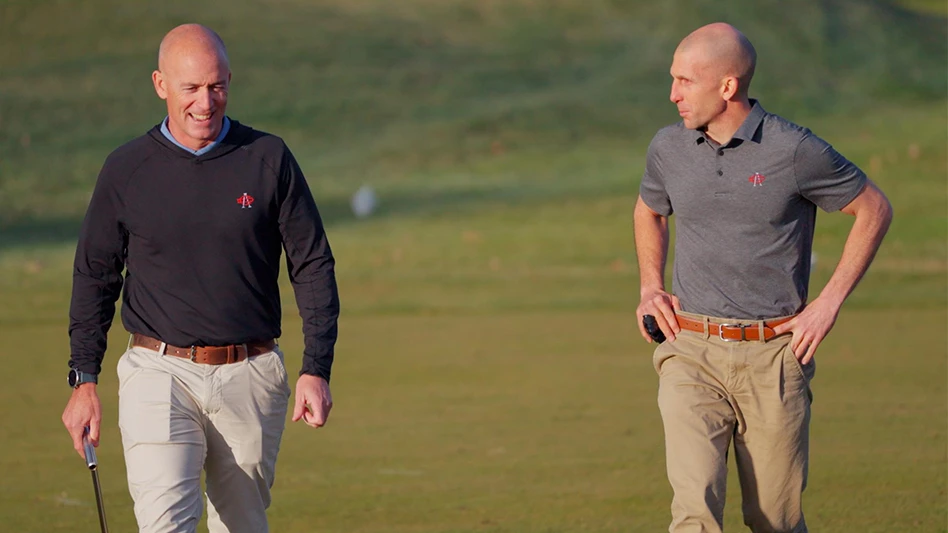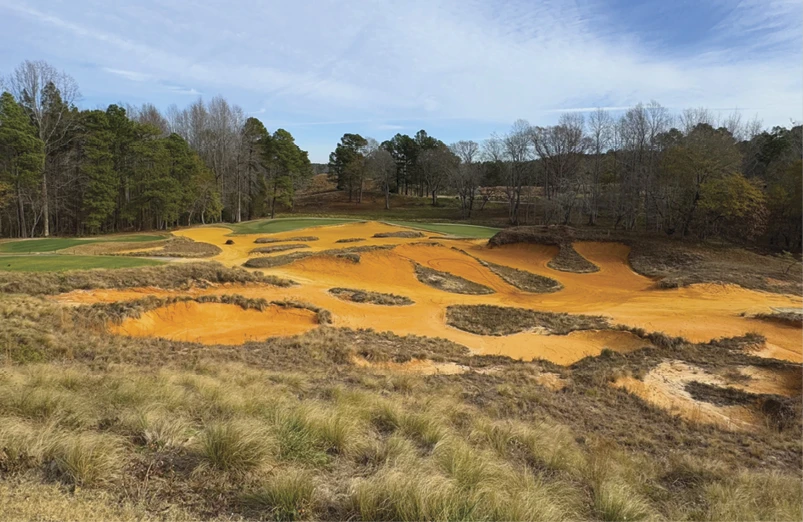 All across the Sunshine State, golf course superintendents were scratching their heads upon hearing that the historic, Donald Ross-designed Lake Wales Country Club in Lake Wales, Fla., had reseeded its greens with T-1 bentgrass, the variety that performed well at Louisville’s Valhalla Golf Club during the 2014 PGA Championship.
All across the Sunshine State, golf course superintendents were scratching their heads upon hearing that the historic, Donald Ross-designed Lake Wales Country Club in Lake Wales, Fla., had reseeded its greens with T-1 bentgrass, the variety that performed well at Louisville’s Valhalla Golf Club during the 2014 PGA Championship.
Consternation had been spreading across Twitter and Facebook like a bad case of Pythium blight, along with concern for superintendent George Mackanos’ job security.
Lake Wales management contacted Golf Course Industry to set the record straight and provided access to the key people involved to do just that. We first talked with Tim Miles, Sr., owner and president of GolfVisions Management, Inc., whose company has leased and operated this semi-private club since early 2013, reversing its declining fortunes in the process.
Before we get into the why and how they came to the decision to try T-1 bentgrass, how they proceeded and how it’s going, let’s introduce the key players.
First, a little background on Miles to better understand how his thought process evolved. He has a degree in horticulture from the University of Missouri and a strong background in agronomy. He has been a certified golf course superintendent. He has been a PGA professional in the Illinois section for over 13 years. He co-founded GreenVisions Inc., a golf management company in 1989. That company merged with Crown Golf Properties in March 1995. It quickly became a $25-million-per-year golf course construction business. He left that business in 1998 to start the full services management company, GolfVisions Management Inc. Between this company and others he was involved with, he has had a part in building courses in 15 states and managing courses in seven or eight states. GolfVisions now manages 20 courses, three of which are near Orlando. They have leased and managed Lake Wales Country Club since early 2013.
Miles is a big believer in hiring the right people and letting them do their jobs. He hired Mackanos as superintendent with that clear understanding right after taking over the course. “I’ve been a superintendent, I have a brother and brother-in-law that are both superintendents,” Miles says. “When I want to know something about a course, I go to the superintendent.”
Mackanos is a lifetime PGA member as well as GCSAA member. He gained his experience as a superintendent on courses from the Midwest to the Southeast. “I’ve been growing bentgrass for 25 years from A-1 to Pencross to Seaside,” he says. “I saw how T-1 performed at Valhalla for the PGA Championship near Louisville. I checked weather conditions between their course and those in Lake Wales and saw enough similarities to do some more digging.”
Meanwhile, Miles also hired Robert (Bob) Foreward in as general manager and head pro. Foreward is a PGA Master Professional and has been involved with the rules of golf in both the PGA and USGA and has served on the rules committee of the Masters. He not only has a good grasp on the game of golf, he knows the relationship between a good course and a good game of golf.
Miles was considering what he could do to make Lake Wales stand out. He expressed his thoughts to Mackanos and Foreward. They discussed expanding the greens back to their original size. The gradual shrinkage over the years had impacted the look and playability. So they decided to restore 35,000 square feet of greens, bringing them back to their designed configuration.
But then Miles asked the question: “What can we do to make these greens the best in the area over the eight or nine months of the year that they receive their heaviest play?” Mackanos suggested changing the greens from Bermudagrass to bentgrass. He had already successfully grown bentgrasses through June in Central Florida. With his bentgrass experience and seeing it at Valhalla, he thought it was worth the attempt.
.jpg) “We avoid the usual transitioning in and out of the Bermuda in the spring and fall,” Mackanos says. “If the bent doesn’t do too well in July and August, as will probably be the case, it is not that much of a problem. Those months are our slowest anyway. The whole idea revolves around providing the best conditions during prime season, when revenue is best, to serve those willing to pay for the product.”
“We avoid the usual transitioning in and out of the Bermuda in the spring and fall,” Mackanos says. “If the bent doesn’t do too well in July and August, as will probably be the case, it is not that much of a problem. Those months are our slowest anyway. The whole idea revolves around providing the best conditions during prime season, when revenue is best, to serve those willing to pay for the product.”
The Lake Wales team didn’t have a lengthy discussion and they agreed the potential benefits were worth the attempt. “I believe that if you don’t try, you can’t succeed,” Miles says. “If things don’t turn out as well as expected, at least we’ll know we made the attempt and we can move forward from there.”
The decision was made. They proceeded to develop the overall plan and take action.
The plan and the process
The first step was to decide on the variety of bentgrass to use. Mackanos talked with his Jacklin Seed representative Scott DeBolt and also went over various trial results. Between seeing T-1 in Louisville, comparing temperature, moisture, humidity, the summer challenges and DeBolt’s recommendation, they decided to use T-1.
The greens were a combination of 419, Tifgreen and Tifdwarf. The middle part of some of the greens had excess thatch. Mackanos decided to leave the Bermuda. He scalped it and started verticutting several times in different directions. He then slit-seeded it in October with the T-1 at the rate of 1.5 to 2 pounds per thousand. Temperatures were in the mid-eighties. Mackanos reported that he considered going up to 3.5 to 4 pounds per thousand, but noted the information from DeBolt and others cautioned against too heavy a seeding, so he felt the lower rate would be sufficient.
Mackanos now knows the higher rate would have been better. He overseeded at 3.5 to 4 pounds per thousand on April 12 and 13 after repeated verticutting leading up to that weekend.
While the stand wasn’t quite what Mackanos had hoped for, he hasn’t received any complaints from players. In fact, the Symetra Tour, a stepping stone to the LPGA Tour, conducted a three-day event at Lake Wales in late March. “We’ve received many cards with comments from the ladies on how much they liked the course.” Miles says, “We had good, fast greens. We’re looking for excellent greens.”
Mackanos and his maintenance staff have deployed – and will continue to deploy – a host of cultural practices to support the bent during adverse conditions. They will begin aerifying by mid-June, maintaining dry conditions as much as possible, quadra-tining/micro-tining weekly, topdressing and spraying three acres of greens every 7 to 10 days if necessary in July and August. “In general, being intense about management,” Miles says. “As any super knows, many more factors than these will be addressed: soil profile, turf nutrition, insect management, weed control, etc.”
Mackanos’ fertilizer package includes Ammonium Sulfate 25-0-0, some 0-0-25 with a micronutrient package. He also uses humates. The topdressing is 75 percent sand and 25 percent peat mix. He does not water at night. He will use a sprinkler four or five times a day on the new seeding if necessary to get it established.
For the summer, the plan is to continue aeration and hold back on the nitrogen applications by the end of June. He also plans to cut back on the water and maintain the greens as dry as possible. He will spray for Pythium and algae on a regular preventive schedule.
As far as how many staff will be required to sustain the bentgrass and perform routine course maintenance, Miles says, “We’ve already heard the negative comments about our total crew of six to eight not being realistic. I believe presumptions like this are one of the reasons so many courses are in trouble. Some superintendents just do not know how to prioritize in today’s challenging golf economy and truly do more with less to continue providing top playing conditions.”
Informing golfers
Another important key to receiving buy-in to a change is communication to the members and daily fee golfers. “This is where the general manager is so important,” Miles says. “I had already invested over $500,000 in improvements and that helped. They knew we were taking many steps to improve their experience.”
The staff communicates with members via email, but Foreward says face-to-face conversations are common at Lake Wales. “Our clientele stops and chats before and after play,” he says. “We always have ample opportunities to keep them informed. There is very little drive by, wave and go to the tee.” Miles adds the timing of the seeding coincided with the typical period the course was previously overseeded with Poa.
With the exception of not using a heavy enough seeding rate to begin with and having to add more this spring, everyone seems to be satisfied with the results. It is too early to call the conversion a success.
 “We’ve got to see what happens in July and August,” Mackanos says. “If it gets too bad and the greens don’t look good enough in July, I’ll go in with Revolver and get the Bermuda going strong and then come in and overseed with bent again in September or October depending on weather conditions and forecasts.” He adds, “No matter what happens, I know that Tim [Miles] and Bob [Foreward] will be right there by my side.”
“We’ve got to see what happens in July and August,” Mackanos says. “If it gets too bad and the greens don’t look good enough in July, I’ll go in with Revolver and get the Bermuda going strong and then come in and overseed with bent again in September or October depending on weather conditions and forecasts.” He adds, “No matter what happens, I know that Tim [Miles] and Bob [Foreward] will be right there by my side.”
Miles scoffs at the suggestion that Mackanos’ job could be in jeopardy if the bentgrass experiment does not pan out.
“As a highly trained owner/operator, I feel the risk is worth the potential reward, and if it fails, so be it,” he says. “George doesn’t have to worry about being fired as I am on board with the idea and not that owner or greens chairman who expects year-round perfection.”
Miles nonetheless expects intense scrutiny from the local superintendent community to continue unabated in the months ahead.
“It’s easy to forget Lake Wales Country Club was a failing entity when GolfVisions took over,” Miles says. “In two years, I have invested over $500,000 in improvements there. Second-guessers love to sit on the sidelines and be cynical, but I am in the game.”
Steven Trusty is a Council Bluffs, Iowa-based writer and frequent GCI contributor.

Explore the June 2015 Issue
Check out more from this issue and find your next story to read.
Latest from Golf Course Industry
- TerraRad receives strategic investment from Old Tom Capital
- Beyond the Page 63: A different approach to labor
- 2025 Super Social Media Awards: Joshua Kelley
- Spanish Bay set for 2026-27 renovation
- An updated Iowa classic turns to Troon
- Introducing our January 2025 issue
- Bergin renovating Florida’s Golf Club at Crown Colony
- Club at Porto Cima picks KemperSports





